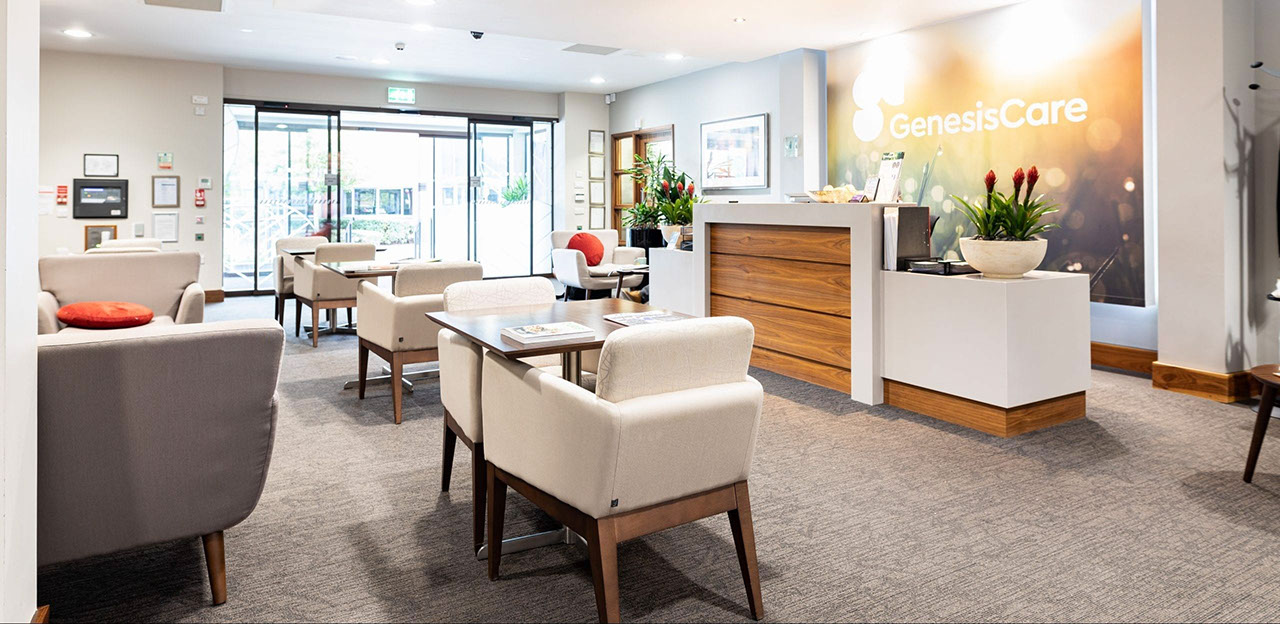- Patients
- Cancer treatments
- Radiotherapy
- MR Linac
- MRI-guided prostate reirradiation

Prostate cancer reirradiation
Our advanced MR Linac technology at our centres in Surrey, Oxford and London, provide a safer and more accurate way to repeat radiotherapy for locally recurrent prostate cancer
Retreatment for prostate cancer
Locally recurrent prostate cancer is when cancer has returned to your prostate or prostate bed after treatment that aimed to cure it, but it hasn’t spread elsewhere. Your consultant will recommend treatment options for you depending on what treatments you’ve had previously and your general health. Your consultant may call these treatments second-line or salvage treatments.
If you’ve previously had prostate radiotherapy where high-energy radiation beams are used to destroy cancer cells, the healthy tissues in and around your prostate may be more sensitive to damage. This can lead to an increased risk of getting more severe side effects from second-line treatments, making it difficult to destroy the cancer while avoiding healthy tissues surrounding the cancer. Consequently, you may be offered androgen deprivation therapy (ADT), also known as hormone therapy, to control your cancer, rather than a treatment that’s aimed at destroying the cancer. However, ADT can often cause unwanted side effects, including impotence, hot flashes, night sweats, increased risk of cardio vascular disease, increased risk of bone fracture and dementia.
Retreating prostate cancer using MRI-guided stereotactic ablative radiotherapy (SABR) is an innovative radiotherapy technique that aims to effectively treat the recurrent cancer or control the disease and delay the need for ADT. SABR is a specialist technique recognised for its ability to treat tumours with minimal damage to surrounding healthy tissue and is often used as a first-line treatment for prostate cancer.
The MR linac is an advanced radiotherapy machine that delivers MRI-guided SABR. This smart radiation technology combines high-resolution magnetic resonance imaging (MRI) techniques with extremely precise radiotherapy beams that can treat tumours more accurately than conventional radiotherapy.
GenesisCare is an expert provider of SABR treatments and have invested in MR Linacs at our centres in Surrey, Oxford and Cromwell Hospital in London to offer our patients access to this latest, world-class treatment. We are proud to be the first UK healthcare provider to offer reirradiation for locally recurrent prostate cancer.
Enquire about localised prostate cancer reirradiation
MRI-guided radiotherapy is available at our centres in Surrey, Oxford and Cromwell Hospital in London. Your cancer specialist can refer you for a consultation. We’re recognised by all major insurers and we’ll help you with transport depending on treatment and locations, when required.
What is an MR Linac?
The MR Linac is a type of linear accelerator (linac) that has the advantage that it can see and adjust for every movement during treatment, making it an ideal technology for complex cancer treatment, such as repeated radiotherapy treatment (called reirradiation) for locally recurrent prostate cancer.
The MR Linac is considered ground-breaking because it turns on the radiation beam only when the tumour is positioned precisely in the treatment window and turns off the beam in an instant if the tumour moves even by a fraction – helping to protect healthy tissue from unnecessary radiation exposure. No other radiotherapy technology in the UK is currently able to achieve this.
We have invested in the MR Linac technology as part of our commitment to provide specialist cancer care that focuses on innovating the latest, evidence-based treatments from around the world.
Benefits of reirradiation with the MR Linac
Reduced side effects and improved quality of life
- The exceptional accuracy of the MR Linac means that the radiation beam can avoid healthy tissues, resulting in fewer side effects when compared with long term androgen deprivation therapy.
Treatment within days
- With treatment on the MR Linac, you may only need five treatments, allowing you to get back to normal life quickly.
An effective option for previously untreatable tumours
- Reirradiation means your cancer can be treated or controlled if you’ve previously had radiotherapy, where other treatments may not be suitable because the risk of severe side effects is too great.
What are the side effects of prostate reirradiation?
Side effects of reirradiation mainly concern your urethra (the tube that carries urine out of the body) where radiation causes inflammation resulting in poor urine flow and discomfort. In some cases, the second dose of radiation causes your urethra to narrow and significantly reduces the ability to empty the bladder. This might require a further surgical procedure at a later date to help correct the issue.
The other main effect that is noticeable is on the bowel with loose stools and often a degree of bleeding visible on passing stool. Most often, these symptoms settle, however, you may continue to experience changes to your urinary function, bowels or both.
All treatments have side effects, so it’s important that you understand the potential risks as well as the benefits. Your consultant will always discuss these with you before starting your recurrent prostate cancer treatment.
It’s important that you attend your follow-up appointments so we can identify and treat any problems as soon as possible. To help with your follow-up, we have developed a bespoke app to collect patient-reported outcome measures (PROMs), so we can monitor long-term side effects of your treatment. Supported by our centre teams, we encourage you to download the app and record your responses at designated intervals from the start of your treatment for recurrent prostate cancer.
We know that living with cancer can be challenging. That’s why you’ll also be offered support through proven life-changing therapies, such as psychological support and wellbeing therapies. These are provided to all patients at no extra cost to you or your insurer, to help you manage the side effects of your localised prostate cancer treatment and symptoms of cancer.
This is our commitment to offer world-class care to every patient with cancer.
Rectal spacers
Before you have prostate reirradiation, your consultant may recommend spacer insertion to lower your risk of side effects. Spacers reduce the radiation exposure to the rectum during prostate cancer radiotherapy meaning fewer side effects and better quality of life. At GenesisCare we offer spacers at no extra cost as part of our service package, to patients who haven’t had their prostate removed and who are undergoing MRI-guided SABR for prostate cancer.
Is it for me?
Reirradiation may be suitable for you if:
- You have not had surgery to remove your prostate (a prostatectomy)
- Have recurrent prostate cancer that has not spread beyond your prostate
- The recurrence is shown on imaging scans and in a biopsy
- The recurrence has occurred at least 18 months after your initial radiotherapy treatment
- You are well enough to undergo the required procedures and don’t have a life-limiting illness
- You have a PSA level of less than 20ng/mL and a doubling time of over six months
- Your urine flow is good or with only mild ongoing urinary symptoms
As each treatment can take over an hour, you must be comfortable lying within the MR Linac for extended periods of time.
Our consultants will discuss your diagnosis, treatments to date and overall health with you in detail before advising if this is right for you.
What does MR Linac treatment involve?
Here is an outline of what to expect after your initial consultation and before, during and after your treatment. There are four stages to the process: your planning appointment, planning, treatment and follow-up. Before your first appointment, your care team will call you to explain any preparation instructions in advance of your appointments and to answer any questions.
The appointment will last for two to three hours and will involve a magnetic resonance imaging (MRI) scan on the MR Linac and a computerised tomography (CT) scan.
It will involve the following steps:
- Your radiographer will explain the process to you and ask you to fill in a safety questionnaire
- You’ll be asked to change into a gown and remove any metal objects such as jewellery, hearing aids, glasses or dentures
- In the treatment room, you’ll lie on a couch where you’ll be placed in position. The radiographer will make some temporary markings on your skin
- Soft pads – called coils – will be placed over your pelvis; these help us to produce high-quality MRI images
- Before your scan, we’ll fit you with earphones so you can listen to music rather than the noise of the scanner. During the scan, which will last for around 20 to 30 minutes, you’ll be able to speak to us through an intercom
- You’ll go to a different room for your CT scan. This scan is much quicker, lasting around five to ten minutes. You’ll be placed in the same position as for your MRI scan
- After your scans, you can go home
Over the next week, your consultant and care team will work together to create a radiotherapy plan that is specific to you. We use advanced computer technology to do this.
Each day your treatment team will ask you to drink some water so that your bladder feels approximately half full. We’ll also carry out many of the same steps at treatment as we did at planning, such as removing accessories and changing clothes. Your treatment will take 45-60 minutes and you will not be allowed to empty your bladder during this time. We will talk to you regularly throughout your treatment and you can talk to us through an intercom.
Before each treatment session, you’ll have a new MRI scan which will be compared with your planning scans. Any movements of your tumour and internal organs will be taken into account and your treatment plan will be carefully adjusted and optimised to account for these changes. Sometimes you may feel the couch that you are lying on move slightly; this is just the treatment team placing you in the perfect position for your treatment.
You can go straight home after each treatment session. You’ll be given contact details for your care team so you can call if you’re worried about anything.
Here’s what will happen after your treatment course has finished.
You’ll be referred back to your own doctor, together with all the information they need to plan any further treatment you may require.
Seven to ten days later: a member of your MRIdian care team will call to see how you are feeling and answer any questions you may have.
Four to six weeks later: you’ll attend a review with your GenesisCare consultant.
In the longer term, we’ll continue to follow up on your recovery and wellbeing through appointments, phone calls and emails with your GenesisCare care team.

Enquire now about prostate reirradiation
The MR Linac is available at our centres in Surrey, Oxford and Cromwell Hospital in London. Your cancer specialist can refer you for a consultation. We’re recognised by all major insurers and we’ll help you with transport depending on treatment and locations, when required.